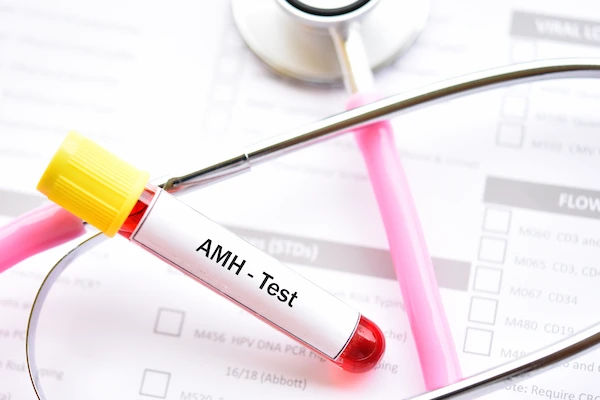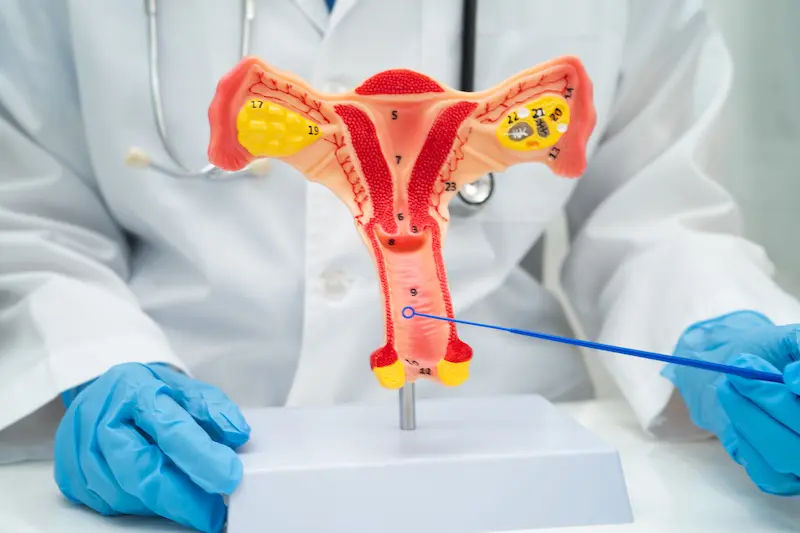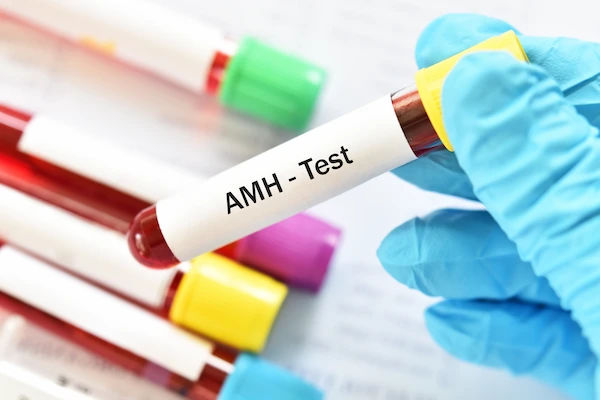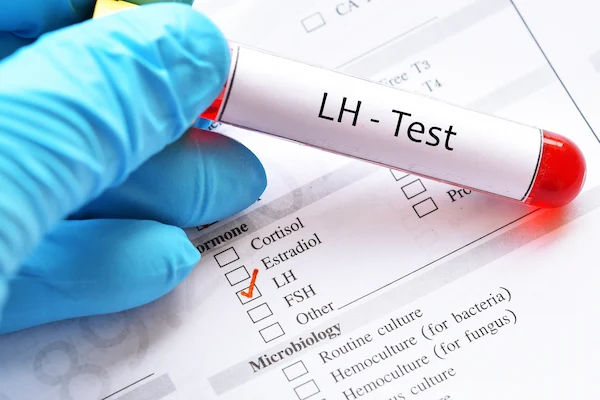Best PCOS Test Panel for Women with Irregular Periods
Irregular periods may be a sign of PCOS. Learn about the best PCOS test panel—FSH, LH, AMH, insulin, thyroid—and how early diagnosis can support fertility and hormone balance.

Written by Dr. Shaik Abdul Kalam
Reviewed by Dr. Rohinipriyanka Pondugula MBBS
Last updated on 9th Sep, 2025

Polycystic Ovary Syndrome (PCOS) is a common hormone-related condition that affects many women, especially those aged 18 to 35. One of the most noticeable and upsetting signs of PCOS is irregular periods. This can mean your periods come too often, too far apart, or stop altogether. If this happens, it’s natural to want answers. The right tests are important not only to find out if you have PCOS, but also to help manage how it affects your fertility, body weight, and overall health in the long term.
This article explains the best PCOS test panel for women with irregular periods. It focuses on key hormone tests like FSH, LH, and AMH, and why speaking with a doctor afterwards is an important part of the process.
Understanding PCOS and Irregular Periods
PCOS is mainly a hormone problem, where certain hormones in the body are out of balance. This imbalance can affect ovulation — the process where the ovaries release an egg each month. When ovulation doesn’t happen regularly, it can lead to irregular periods. Some women with PCOS may have fewer than eight periods a year or may not get their period for several months at a time.
The underlying causes of PCOS are not fully understood, but a combination of genetic and environmental factors, insulin resistance, and hormonal imbalances are known contributors. Because PCOS symptoms vary widely from acne and unwanted hair growth to infertility and mood changes, a thorough and individualised approach to diagnosis is crucial.
Why Testing Matters: The Role of Hormones
Irregular periods can be caused by many different conditions, including thyroid disorders, high prolactin levels, extreme weight changes, and stress. Therefore, it is vital to confirm whether PCOS is truly the cause. This is where targeted hormone testing becomes invaluable.
A PCOS test panel helps identify whether the hormonal imbalances typically associated with PCOS are present, guiding an accurate diagnosis and enabling personalised treatment. It can also rule out other underlying causes that might mimic PCOS symptoms.
The Essential PCOS Test Panel
For women experiencing irregular periods and suspecting PCOS, the most informative test panel includes a combination of the following key hormones:
1. Follicle-Stimulating Hormone (FSH)
FSH is a hormone produced by the pituitary gland that helps control the menstrual cycle and stimulates the growth of ovarian follicles. In women with PCOS, FSH levels may be within the normal range or slightly lower, which can hinder the maturation of eggs and regular ovulation.
When FSH is measured in conjunction with other hormones, especially LH, it provides a clearer picture of ovarian function.
2. Luteinising Hormone (LH)
LH is a hormone made by the pituitary gland, and it helps trigger ovulation — when the ovary releases an egg. In many women with PCOS, LH levels are higher than normal compared to another hormone called FSH. This creates an uneven LH to FSH ratio, often higher than 2 to 1.
This imbalance can stop regular ovulation and lead to the buildup of many small, undeveloped eggs in the ovaries. These are sometimes wrongly called “cysts,” but they are actually immature follicles.
3. Anti-Müllerian Hormone (AMH)
AMH is produced by the ovarian follicles and is considered a reliable indicator of ovarian reserve. Women with PCOS often have significantly elevated AMH levels due to a higher number of undeveloped follicles in their ovaries.
AMH testing is particularly useful in confirming PCOS, especially when used in combination with LH and FSH. High AMH levels, when associated with other symptoms like irregular cycles and signs of androgen excess (e.g. acne, hirsutism), strongly support a PCOS diagnosis.
4. Androgen Profile (Testosterone and DHEA-S)
Excess androgen levels are a hallmark feature of PCOS. A hormone test for PCOS typically includes total and free testosterone, and sometimes DHEA-S (dehydroepiandrosterone sulphate). Elevated levels can cause symptoms such as excessive facial or body hair, oily skin, and persistent acne.
5. Prolactin
While not directly linked to PCOS, prolactin should be checked to exclude other causes of menstrual irregularities, such as prolactinoma, a benign tumour of the pituitary gland that can cause irregular or missed periods.
6. Thyroid Function Tests
An underactive thyroid (hypothyroidism) can mimic symptoms of PCOS and affect the menstrual cycle. Testing thyroid-stimulating hormone (TSH) and free T4 levels helps ensure that other hormonal conditions are not overlooked.
7. Fasting Insulin and Glucose
Many women with PCOS experience insulin resistance, which can lead to weight gain, difficulty losing weight, and an increased risk of type 2 diabetes. Checking fasting insulin and glucose levels helps assess metabolic health and informs decisions on dietary and medical interventions.
Get Your Health Assessed Here
Why the FSH, LH, and AMH Combination Matters
Among all the available hormone tests, the combination of FSH, LH, and AMH provides one of the clearest hormonal signatures of PCOS. When tested together, these hormones can reveal:
- A high LH: FSH ratio, which suggests impaired ovulation
- Elevated AMH, reflecting the increased number of immature ovarian follicles
- Suppressed or normal FSH levels, indicating underactive follicle development
This triad is especially useful for identifying PCOS in women with irregular or absent periods who may not display overt signs of excess androgens.
When to Get Tested
The timing of hormone testing can significantly impact the results. Tests for LH, FSH, and estradiol should be performed between days 2 and 5 of your menstrual cycle (if you are still menstruating). However, for women with very irregular or absent periods, your doctor may recommend testing at any time or after using medication to induce a period.
Fasting is typically required before insulin and glucose testing, and your doctor will provide guidance on preparation for the full panel.
The Importance of Professional Interpretation and Counselling
While hormone tests can provide a wealth of information, interpreting them correctly requires medical expertise. Hormonal values can vary significantly depending on the time of day, menstrual cycle phase, and the laboratory method used. Moreover, not all women with PCOS have the same test results, and other conditions can sometimes mimic PCOS.
This is why professional counselling following a PCOS test is essential. A doctor, typically a gynaecologist or endocrinologist, will:
- Evaluate your full medical history
- Interpret your test results in context
- Confirm or rule out a PCOS diagnosis
- Discuss treatment options tailored to your goals (e.g. fertility, weight management, acne control)
- Provide long-term guidance for managing PCOS and reducing associated risks
A test is only as useful as the interpretation that follows. This step bridges the gap between lab results and meaningful, effective care.
When you're dealing with symptoms like irregular periods, acne, excess hair growth, or fertility concerns, Apollo 24|7 offers a trusted, comprehensive, and convenient solution for diagnosing PCOS.
- Thorough Hormonal & Metabolic Panels: Apollo’s packages cover all essential markers:
- Basic: Testosterone, LH, FSH, Prolactin, TSH, fasting glucose, and insulin.
- Advanced/Comprehensive: Includes additional tests like DHEAS and 17‑OHP, and even extended metabolic markers like HOMA‑IR and lipid profile for deeper insight.
- Quick, Secure Reports: Results typically arrive within 24–48 hours, securely accessed via the app or website—ideal for timely diagnosis and follow-up.
- Accredited Lab Network: All tests are processed in NABL- & CAP-accredited labs, ensuring high accuracy and reliability across India.
- Expert Guidance: While Apollo 24|7 focuses on diagnostics, their allied gynae/endocrinologists and dietitians can help interpret results and advise on treatment or fertility planning.
How This Test Panel Benefits You
Undergoing a comprehensive PCOS test panel offers several advantages:
- Clarity: Understand the true cause of irregular periods and whether PCOS is the underlying issue.
- Prevention: Detect related metabolic risks early, such as insulin resistance and diabetes.
- Planning: Support informed decisions about fertility, contraception, and long-term reproductive health.
- Treatment: Receive personalised treatment options based on hormonal profiles, not guesswork.
- Peace of mind: Rule out other conditions that may be causing your symptoms.
Conclusion
If you are a woman aged 18 - 35 experiencing irregular periods, getting a PCOS test panel is a proactive step towards understanding your body and securing your health. The most effective panel includes a targeted combination of FSH, LH, and AMH tests, alongside a broader hormone and metabolic assessment. Equally important is the follow-up consultation with a qualified doctor who can interpret these results and guide you through the next steps.
Hormone testing for PCOS is not just about diagnosis; it is about empowerment. It helps you make informed decisions, explore treatment options, and regain control of your menstrual health and fertility. If you are concerned about irregular periods or PCOS symptoms, speak to your healthcare provider about scheduling a comprehensive hormone test for PCOS today. Early diagnosis and the right guidance can make all the difference.







